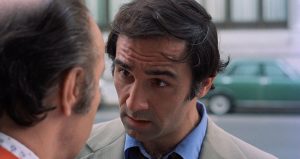ISN’T it great when you come across a film you have never heard of that’s actually pretty good?
God Told Me To is a sci-fi horror film that has completely slipped under my radar for four decades.
It was released in 1976, the same year as the horror classic The Omen, and was written, directed, and produced by Larry Cohen.
The late New York based director’s best known films are a couple of minor cult horror classics, It’s Alive and The Stuff, but God Told Me To is in a league of its own.
In New York City, a gunman on a water tower opens fire on the crowded streets, randomly killing 15 people. The gunman is surrounded by police and Detective Peter Nicholas climbs the tower to talk to him.
But the gunman tells Nicholas that God told him to commit the murders and then jumps to his death.
Over coming days other incidents occur – a mass stabbing at a supermarket, a mass shooting by a police officer at a St. Patrick’s Day parade, a man murders his wife and children. Nicholas discovers a common link between the seemingly unrelated events – all the assailants claimed that God told them to kill.
As a devout Catholic Nicholas is shocked and confused by the cases. He also learns that a couple of the assailants were seen talking to a long-haired young man just before they struck.
On visiting the man’s home, Nicholas is attacked by his mother who falls down a flight of stairs and dies. What an autopsy reveals about the dead woman leads Nicholas on an obsessive investigation during which his faith is shaken to the core.
From this point on God Told Me To becomes a fascinating but flawed attempt to examine theological questions within a narrative mixing supernatural and science-fiction elements.
Cohen struggles to remain in control of all the ideas he wants to present and explore and the overall editing suggests some key connecting tissue may have been left on the cutting room floor.
While some moments of the final act could seem laughable to some, there is no denying the moments of tension and suspense created through guerrilla film-making on the city’s streets during the first half and strong lighting and photography during some of the interior confrontations.
As Nicholas, Tony Lo Bianco does a pretty good job of portraying a man whose foundation in faith, principles and family is tested to the extreme.
Not a great film, but definitely an oddity that fans of films of that era, particularly by directors like William Friedkin and Paul Schrader, will find very interesting.
